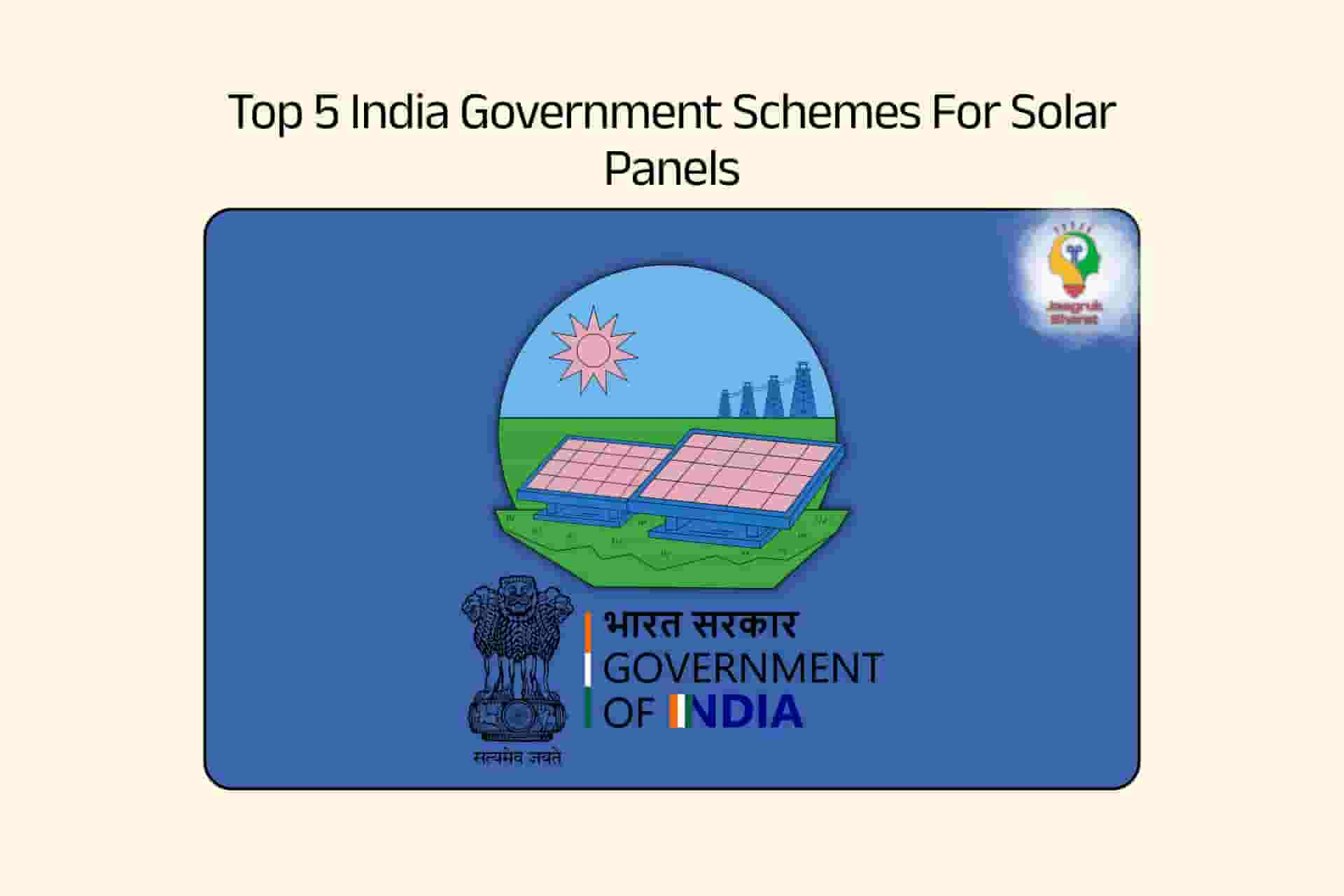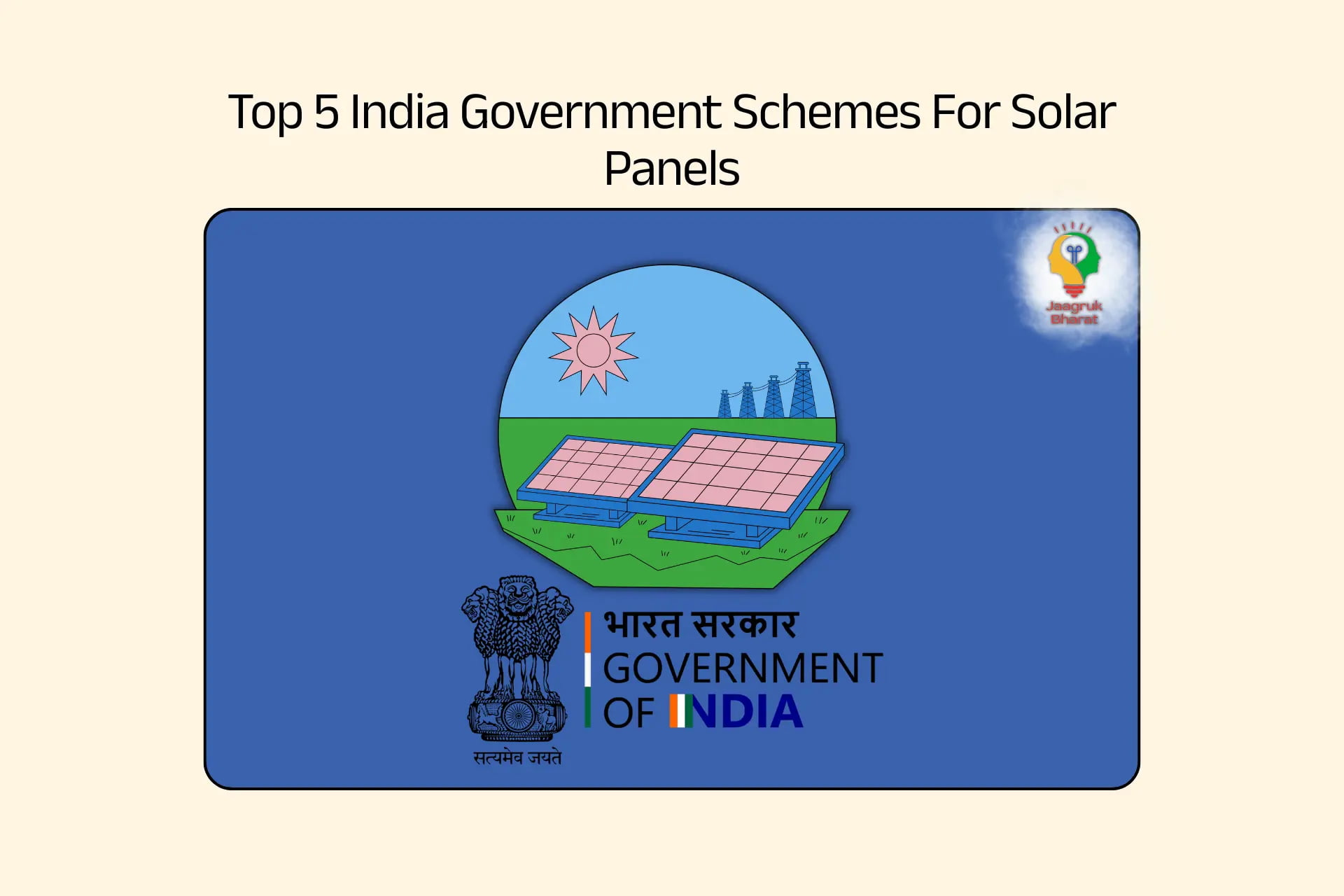Top 5 India Government Schemes For Solar Panels In 2025
Updated: 08-10-2025 at 5:34 PM
10k


India's burgeoning transition towards renewable energy sources is being aided by government schemes. One such new source of renewable energy is solar panels. These government yojana for solar panels render financial aid, provide subsidies, and encourage the adoption of solar energy among different categories like households, agriculture, and industries. These schemes lower expenses and support clean energy which makes solar panels available to the masses and fosters environmental and economic benefits.
This article provides a comprehensive overview of India’s top 5 solar panel schemes for 2025, detailing their benefits, eligibility, and features.
Read More: Balcony Solar And BIPV Allowed Under PM Surya Ghar Yojana
Overview Of 5 Solar Panel Schemes
| Scheme Name | Target Audience | Key Benefits |
|---|---|---|
| PM Surya Ghar Muft Bijli Yojana | Residential households | Free electricity for solar users |
| Grid Connected Rooftop Solar Programme | Households, industries | 40% subsidy for solar installations |
| PM-KUSUM Scheme | Farmers | Subsidised solar pumps and systems |
| PLI Scheme: High-Efficiency Solar PV | Manufacturers | Financial incentives for solar module production |
| Delhi Solar Energy Policy 2023 | Residents of Delhi | Subsidies for rooftop solar and net metering |
What Are Government Solar Panel Schemes?
Government subsidies for solar panels can be defined as programs, established and designed to foster the use of renewable energy for which financial resources are made available and a solar panel is set up. These programs are meant to promote the use of solar energy, cutting down reliance on non-renewable resources and promoting a better tomorrow.
Why Do We Need Government Solar Panel Schemes?
Government solar panel schemes should be crucial to the people as they encourage and promote the use of clean energy. They assist individuals and industries in switching to greener energy, which is more beneficial to the environment. These schemes bring a lot of advantages from households to agriculture, as explained below:
-
Mitigation of Climate Change: Reducing carbon emissions is essential if we are to protect the environment.
-
Self-sufficiency: Promotes independence in power generation.
-
Reduction in expenses: Cuts down on electricity costs for households and industries.
-
Electrification of Rural Areas: Brings power to the most secluded areas.
-
Increased Economy: Enhances the growth of investment into the clean energy market.
Read More: What Is Mission Mausam?
Who Can Avail The Benefits Of These Schemes?
Solar panel schemes are aimed at a certain group of people and organisations. These solar energy systems help reduce expenditures on electricity. Here’s who can take advantage of these schemes:
-
Households: Domestic consumers can put up solar panels so that there is less reliance on energy bills.
-
Farmers: Get Aid on solar water pumps and energy systems on certain schemes.
-
Industries: Covered under incentives and subsidies in the use of solar solutions.
-
Educational Institutions: Universities and colleges stand to gain under such clean energy projects.
-
Government and Public Sector Organisations: Motivated to use solar energy to lessen the cost of operations.
Top 5 Government Schemes For Solar Panels
With the world turning its attention towards green energies, India has been promoting solar power through various government schemes. These plans are aimed at making solar energy easy to access, cost-effective as well as reliable. Here’s an in-depth summary of the 5 government schemes which foster the use of solar panels in India.
1. PM Surya Ghar Muft Bijli Yojana
About:
This scheme is a flagship initiative for providing free electricity via the installation of rooftop solar units to maximise decentralisation. The aim of this is to reduce reliance on normal electricity supplies while at the same time promoting clean sources of energy.
Features:
-
100% Subsidy: Households below the poverty line are entirely funded to get solar panels.
-
Net Metering: Consumers are allowed to sell excess energy back to the grid and earn credits on their energy consumption.
Eligibility:
-
Applicant should be of Indian origin.
-
Applicant must be an owner of a building which is capable of holding a suitable roof for a solar panel.
Benefits:
-
Minimum Electricity Bills as households should be able to get free electricity.
-
Clean Energy Adoption as it helps the environment by lowering the carbon footprint.
2. Grid Connected Rooftop Solar Programme
About:
The Grid Connected Rooftop Solar Programme is an initiative by the government which focuses on the installation of solar energy systems in residential, institutional, and industrial buildings. The scheme offers subsidy which helps to finance every household’s rooftop solar system purchase. Households can receive a subsidy not exceeding 40% for systems 3kW and below. 20% is the upper limit for households with systems ranging from 3kW to 10kW.
Features:
Subsidy for Households: A 40% subsidy is provided for systems that use up to 3 kW. A subsidy of 20 per cent is provided for installations of between 3 – 10 kW.
This is applicable for grid connection systems which allow available energy to be exported and also reduce reliance on conventional sources of power.
Eligibility:
-
Available to households, industries and institutions.
-
The installation must meet the minimum government-authorised technical standards.
Benefits:
-
Cost Savings: Visible savings on electricity bills.
-
Promotes Green Energy: Less reliance on fossil energy sources.
3. PM-KUSUM Scheme
About:
The PM-KUSUM scheme facilitates farmers to install solar-powered irrigation and help lower agricultural costs. Pradhan Mantri Kisan Urja Suraksha Evam Utthaan Mahabhiyan was launched to assist farmers.
Features:
-
Subsidised Solar Pumps: Provides a 60% subsidy on the installation of solar water pumps.
-
Energy Sales: Farmers can sell surplus power generated from solar systems to DISCOMs and earn an income from that surplus power.
Eligibility:
-
Farmers having cultivable land are eligible.
-
Pumps installed under this scheme should conform to the norms outlined in the scheme guidelines.
Benefits:
-
Cost Reduction: Limits expenses incurred on irrigation.
-
Additional Income: Farmers can make money selling a surplus of unused electricity.
Read More: Saur Sujala Yojana 2025
4. Production Linked Incentive (PLI) Scheme: National Programme on High-Efficiency Solar PV Modules
About:
The main objective of the PLI scheme is to enhance the domestic capacity of solar photovoltaic (PV) modules in India to decrease reliance on imports while increasing the country’s renewable energy production.
Features:
-
Financial Assistance: Offers incentives to the manufacturers depending on certain production and efficiency targets.
-
R&D Support: Helps in funding more development in solar technology.
Eligibility:
-
Slated for manufacturers of solar PV modules.
-
There are production targets and efficiency levels to be met.
Benefits:
-
Increase in Local Manufacturing: Lower reliance on solar equipment obtained through imports.
-
Gains for Renewable Energy: Augments the amount of solar energy in India.
5. Delhi Solar Energy Policy 2023
About:
The Delhi Solar Energy Policy 2023 seeks to increase the deployment of rooftop solar systems in the capital city. It provides subsidies of ₹20,000 per kW for solar systems aimed at minimising the cost of system installation. Furthermore, the policy includes provisions for net metering, whereby consumers can feed power back into the grid and get paid for it, which lowers electricity expenses. Besides promoting the use of renewable energy, this policy also increases the energy self-sufficiency of consumers and supports Delhi’s targets for carbon emission reductions and improving the green environment.
Features:
-
Subsidies: Provides maximum financial assistance of up to ₹20,000 per kW on installation of rooftop solar systems.
-
Net Metering: Consumers can sell their surplus energy back to the grid whenever they produce more than they consume.
Eligibility:
- Indian citizens residing in Delhi and whose buildings have adequate roof area for solar fitting.
Benefits:
-
Energy Savings: Offers an immense reduction in electricity bills.
-
Sustainability: A revolutionary step towards clean energy generation in a distributed manner.
What More Can Be Done?
Solar energy has great potential to help us save the environment and reduce energy costs. However, to make the most of it, we need to improve how people use and understand solar energy. Here are a few steps that can make a big difference:
-
Awareness Campaigns: These will bring about more publicity about the utilisation of solar energy schemes.
-
Simplify Processes: Such schemes’ application and approval processes are currently very complex.
-
Expand Coverage: Add more distant and rural regions under these schemes.
-
Encourage Innovations: More R&D money is required for complex solar technologies.
Conclusion
The government schemes for solar panels are one of the most important drivers in the adoption of renewable energy sources in India. These schemes on one end, assist in maintaining residential and industry self-sufficiency and sustainability, while on the other hand, motivate manufacturing. By taking part in these schemes, individually and collectively, people and industries can make savings and help a green planet.
Join the conversation and stay informed! Visit the Jaagruk Bharat community page here and be part of an active, engaged community.
Frequently Asked Questions
0
0
10k
0
0
10k Views
0
No comments available





Our Company
Home
About
T&C
Privacy Policy
Eula
Disclaimer Policy
Code of Ethics
Contact Us
Careers
Cancellation & Refund Policy
Categories
Women
Insurance
Finance
Tax
Travel
Transport & Infrastructure
Food
Entertainment
Communication
Government ID Cards
E-commerce
Traffic guidelines
Miscellaneous
Housing and Sanitation
Sports
Startup
Environment and Safety
Education
Agriculture
Social cause
Employment
Disclaimer: Jaagruk Bharat is a private organization offering support for documentation and government scheme access. We are not affiliated with any government body. Official services are available on respective government portals. Our goal is to make processes easier and more accessible for citizens.
All Copyrights are reserved by Jaagruk Bharat